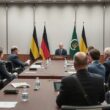German Defense Minister Boris Pistorius has cautioned that Russia could be capable of attacking NATO member states within a few years, according to statements released to the Handelsblatt newspaper. Pistorius indicated that both the Federal Intelligence Service (BND) and defense officials assess Russia will have reconstituted its military forces by approximately 2029, potentially enabling such an action.
While acknowledging that a direct attack is not assured, Pistorius emphasized the necessity of preparedness, stating that policymakers must not solely rely on optimistic scenarios but must also plan for worst-case developments.
Comparing the current geopolitical climate to the Cold War era, Pistorius described a situation characterized by a lack of direct armed conflict but punctuated by provocations, particularly through hybrid attacks. He directly implicated Russia in recent drone incidents impacting Denmark and Poland, asserting that no other actor possesses a discernible motive to deploy drones in such quantities to those regions.
Pistorius voiced his support for a proposed drone defense law championed by Interior Minister Alexander Dobrindt, which would expand the Bundeswehr’s authority to intercept projectiles beyond its traditional operational areas when requested to assist law enforcement. He stressed the change would be implemented in a manner consistent with constitutional principles.
However, Pistorius tempered expectations regarding the Bundeswehr’s capabilities in addressing drone incursions, referencing recent events at Munich Airport. He clarified that the military cannot be deployed to every location where drones are detected across Germany and highlighted the critical need for state and federal police forces to develop their own capabilities for handling drone threats at lower altitudes. Furthermore, operators of critical infrastructure, such as airports and power plants, were identified as essential partners in bolstering security measures.





